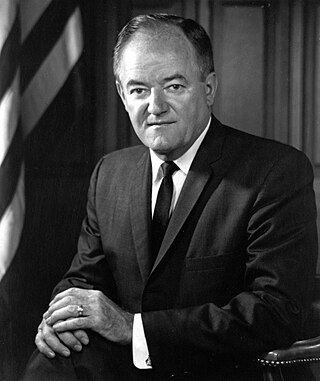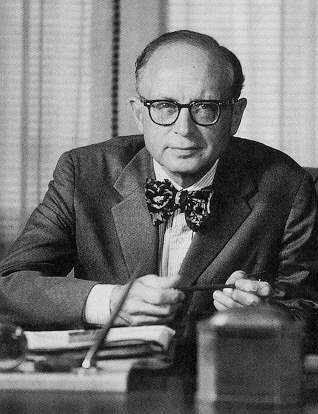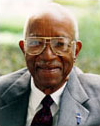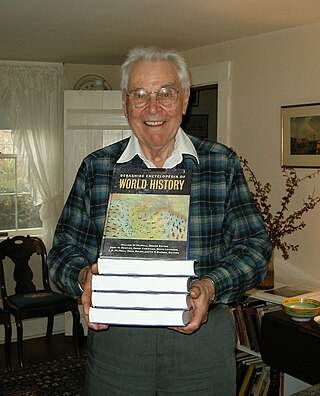
Richard Joseph Daley was an American politician who served as the mayor of Chicago from 1955, and the chairman of the Cook County Democratic Party Central Committee from 1953, until his death. He has been called "the last of the big city bosses" who controlled and mobilized American cities. Daley was Chicago's third consecutive mayor from the working-class, heavily Irish American South Side neighborhood of Bridgeport, where he lived his entire life. He was the patriarch of the Daley family, whose members include Richard M. Daley, another former mayor of Chicago; William M. Daley, a former United States Secretary of Commerce; John P. Daley, a member of the Cook County Board of Commissioners; and Patrick Daley Thompson, a former alderman of the Chicago City Council.

Hubert Horatio Humphrey Jr. was an American politician and statesman who served as the 38th vice president of the United States from 1965 to 1969. He twice served in the United States Senate, representing Minnesota from 1949 to 1964 and 1971 to 1978. As a senator he was a major leader of modern liberalism in the United States. As President Lyndon B. Johnson's vice president, he supported the controversial Vietnam War. An intensely divided Democratic Party nominated him in the 1968 presidential election, which he lost to Republican nominee Richard Nixon.

Human Rights Watch (HRW) is an international non-governmental organization headquartered in New York City that conducts research and advocacy on human rights. The group pressures governments, policymakers, companies, and individual human rights abusers to denounce abuse and respect human rights, and often works on behalf of refugees, children, migrants, and political prisoners.

In the 1860s, the Copperheads, also known as Peace Democrats, were a faction of the Democratic Party in the Union who opposed the American Civil War and wanted an immediate peace settlement with the Confederates.

Daniel Joseph Boorstin was an American historian at the University of Chicago who wrote on many topics in American and world history. He was appointed the twelfth Librarian of the United States Congress in 1975 and served until 1987. He was instrumental in the creation of the Center for the Book at the Library of Congress.

Arthur Meier Schlesinger was an American historian who taught at Harvard University, pioneering social history and urban history. He was a Progressive Era intellectual who stressed material causes and downplayed ideology and values as motivations for historical actors. He was highly influential as a director of PhD dissertations at Harvard for three decades, especially in the fields of social, women's, and immigration history. His son, Arthur M. Schlesinger Jr. (1917–2007), also taught at Harvard and was a noted historian.

Abner Joseph Mikva was an American politician, federal judge, and legal scholar. He was a member of the Democratic Party. Mikva served in the United States House of Representatives representing Illinois's 2nd congressional district (1969–1973) and 10th congressional district (1975–1979). He was appointed as a United States circuit judge of the United States Court of Appeals for the District of Columbia Circuit by President Jimmy Carter, serving from 1979 to 1994. He served as the White House Counsel from 1994 to 1995 during Bill Clinton's presidency. He was one of the few people in modern times to serve in the executive, legislative and judicial branches of the Federal government.

Rennard Cordon Davis was an American anti-war activist who gained prominence in the 1960s. He was one of the Chicago Seven defendants charged for anti-war demonstrations and large-scale protests at the 1968 Democratic National Convention in Chicago. He had a prominent organizational role in the American anti–Vietnam War protest movement of the 1960s.

Lester Frank Ward was an American botanist, paleontologist, and sociologist. He served as the first president of the American Sociological Association.

Claude Gernade Bowers was a newspaper columnist and editor, author of best-selling books on American history, Democratic Party politician, and President Franklin D. Roosevelt's ambassador to Spain (1933–1939) and Chile (1939–1953). His histories of the Democratic Party in its formative years from the 1790s to the 1830s helped shape the party's self-image as a powerful force against monopoly and privilege. Bowers was a sharp critic of Republicans and their Reconstruction policies for African American voting rights and civil rights.

John Hope Franklin was an American historian of the United States and former president of Phi Beta Kappa, the Organization of American Historians, the American Historical Association, and the Southern Historical Association. Franklin is best known for his work From Slavery to Freedom, first published in 1947, and continually updated. More than three million copies have been sold. In 1995, he was awarded the Presidential Medal of Freedom, the nation's highest civilian honor.
In United States politics, modern liberalism is a form of social liberalism that is one of two current major political factions in the United States. It combines ideas of civil liberty and equality with support for social justice. Economically, modern liberalism supports government regulation on private industry and opposes corporate monopolies. It opposes cuts to the social safety net, while simultaneously promoting income-proportional tax reform policies to reduce deficits. It supports a role for government in reducing economic inequality, increasing diversity, providing access to education, ensuring healthcare, regulating economic activity, and protecting the natural environment. This form of liberalism took shape in the 20th century as the voting franchise and other civil rights were extended to a larger class of citizens, most notably among African Americans and women. Major examples of modern liberal policy programs include the New Deal, the Fair Deal, the New Frontier, the Great Society, the Affordable Care Act, and the Infrastructure Investment and Jobs Act.
Paul Finkelman is an American legal historian. He is the author or editor of more than 50 books on American legal and constitutional history, slavery, general American history and baseball. In addition, he has authored more than 200 scholarly articles on these and many other subjects. From 2017 - 2022, Finkelman served as the President and Chancellor of Gratz College, Melrose Park, Pennsylvania.
Richard Weikart is a professor of history at California State University, Stanislaus, advocate of intelligent design and senior fellow for the Center for Science and Culture of the Discovery Institute. In 1997 he joined the editorial board of the Access Research Network's Origins & Design Journal. Weikart's work focuses on claims about the impact of evolution on social thought, ethics and morality.

William Hardy McNeill was an American historian and author, noted for his argument that contact and exchange among civilizations is what drives human history forward, first postulated in The Rise of the West (1963). He was the Robert A. Millikan Distinguished Service Professor Emeritus of History at the University of Chicago, where he taught from 1947 until his retirement in 1987.

St. Ambrose University (SAU) is a private Catholic university in Davenport, Iowa. It was founded as a school of commerce for young men in 1882.
John Louis Lucaites is an American academic. He is a professor emeritus of rhetoric and public culture at Indiana University. In 2012, Lucaites was appointed as associate dean for arts and humanities and undergraduate education at Indiana University. His research concerns the general relationship between rhetoric and social theory, and seeks to contribute in particular to the critique and reconstruction of liberalism in contemporary social, political, and cultural practices in the United States.
John Durham Peters is the María Rosa Menocal Professor of English and of Film & Media Studies at Yale University. A media historian and social theorist, he has authored a number of noted scholarly works. His first book, Speaking into the Air: A History of the Idea of Communication, traces out broad historical, philosophical, religious, cultural, legal, and technological contexts for the study of communication. His second book Courting the Abyss: Free Speech and the Liberal Tradition updates the philosophy of free expression with a history of liberal thought since Paul of Tarsus. His signal work of media philosophy The Marvelous Clouds: Toward a Philosophy of Elemental Media radically rethinks how media are environments and environments are also media. His most recent book, coauthored with the late Kenneth Cmiel, Promiscuous Knowledge offers a genealogy of the information age from its earliest origins, focusing on the nineteenth and twentieth centuries into the present moment. He has advised dozens of dissertations and published hundreds of articles and chapters. Peters has held fellowships with the National Endowment for the Humanities, the Fulbright Foundation, and the Leverhulme Trust, among others.

Iowa is a state in the upper Midwestern region of the United States, bordered by the Mississippi River to the east and the Missouri River and Big Sioux River to the west. It is bordered by six states: Wisconsin to the northeast, Illinois to the east and southeast, Missouri to the south, Nebraska to the west, South Dakota to the northwest, and Minnesota to the north.
William Beatty Pickett is an American historian and professor emeritus at Rose-Hulman Institute of Technology in Terre Haute, Indiana. He is known as an authority on President Dwight D. Eisenhower and Indiana Sen. Homer E. Capehart, and is the author of several well-regarded books on U.S. history including Dwight David Eisenhower and American Power and Eisenhower Decides To Run: Presidential Politics and Cold War Strategy.













